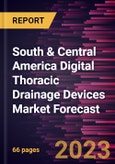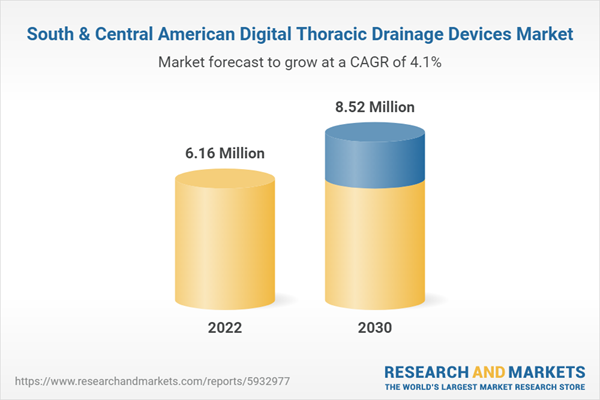Inclination Toward Digital Devices Fuels South & Central America Digital Thoracic Drainage Devices Market
The healthcare sector is keen on adopting medical devices enabled by digital technologies. The incorporation of IoT and artificial intelligence imparts capabilities such as real-time readings and health tracking into digital medical devices. Currently, the healthcare sector is rapidly adopting telecommunications devices in respiratory applications. Digital technologies in pulmonary function monitoring have been affirmed to provide significant and cost-effective results in home-care settings. An internet-based digital drainage system would help healthcare staff to monitor their patients’ health in the homecare settings, alongside enabling an early discharge of patients from hospitals, thus facilitating cost reduction. With these systems, healthcare providers can address all patient concerns remotely. However, a few of the notable risks associated with internet-based digital thoracic drainage devices include uncertainties related to the internet, leading to may create emergencies such as disconnection or malfunction of the device due to poor connectivity. Such shortcomings make taking intermediate steps, such as integrating good internet network with better connectivity and installing systems to notify the disparity in the readings provided by the digital thoracic systems before discharging patients essential. Irrespective of these limitations, internet-based digital thoracic drainage devices are expected to have a good possibility of acceptance in the thoracic telemedicine area, thereby providing notable growth opportunities to the South & Central America digital thoracic drainage devices market in the future.South & Central America Digital Thoracic Drainage Devices Market Overview
The South & Central America digital thoracic drainage devices market in South & Central America is sub segmented into the Brazil, Argentina, and the Rest of South & Central America. The growth of the market is attributed to growing technological developments in the field of thoracic surgeries and growing medical tourism. Brazil is among the largest economies in South & Central America, with a well-established healthcare system. The country has some well-recognized facilities offering effective thoracic surgical services, which indicates its receptiveness toward the adoption of technologically advanced products to offer the best-quality treatments and care. In the past, the Brazilian healthcare sector used thoracic surgeries as an effective tool to treat pulmonary tuberculosis. With further technological advancement, traditional open thoracotomies transitioned to minimally invasive surgeries and complex procedures. Later, thoracic surgeries were separated from general and cardiac surgeries to group them as an autonomous specialty. The developments also enable departments specializing in thoracic surgeries to differentiate general and cardiac surgery to become recognized as autonomous specialty. The Brazilian Society of Thoracic Surgery [Sociedade Brasileira de Cirurgia Torácica (SBCT)] is evolved as the biggest society dedicated to general thoracic surgery in the region with over 750 active members. As per the article “Thoracic Surgery in Brazil: an overview,” published in the Journal of Thoracic Diseases in August 2022, Brazil had ~1,106 active thoracic surgeons in 2020. Thus, the number of active number thoracic surgery indicates that the country has performed a good number of thoracic surgeries, which indicates opportunities for the growth of the South & Central America digital thoracic drainage devices market players in the country.South & Central America Digital Thoracic Drainage Devices Market Revenue and Forecast to 2030 (US$ Million)
South & Central America Digital Thoracic Drainage Devices Market Segmentation
The South & Central America digital thoracic drainage devices market is segmented into product type, application, end user, and country.Based on product type, the South & Central America digital thoracic drainage devices market is segmented into single chamber and multiple chambers. The single chamber segment held a larger share of the South & Central America digital thoracic drainage devices market in 2022.
Based on application, the South & Central America digital thoracic drainage devices market is segmented into cardiac surgery, thoracic and pulmonary surgery, oncology and trauma, infectious diseases, and others. The thoracic and pulmonary surgery segment held the largest share of the South & Central America digital thoracic drainage devices market in 2022.
Based on end user, the South & Central America digital thoracic drainage devices market is segmented into hospitals, ambulatory surgical centers, and others. The hospitals segment held the largest share of the South & Central America digital thoracic drainage devices market in 2022.
Based on country, the South & Central America digital thoracic drainage devices market is segmented int o Brazil, Argentina, and the Rest of South & Central America. Brazil dominated the South & Central America digital thoracic drainage devices market in 2022.
Cardinal Health Inc, Getinge AB, Medela AG, Redax SpA, and Teleflex Inc are some of the leading companies operating in the South & Central America digital thoracic drainage devices market.
Table of Contents
Executive Summary
At 4.1% CAGR, the South & Central America Digital Thoracic Drainage Devices Market is speculated to be worth US$ 8.52 million by 2030.According to this research, the South & Central America digital thoracic drainage devices market was valued at US$ 6.16 million in 2022 and is expected to reach US$ 8.52 million by 2030, registering a CAGR of 4.1% from 2022 to 2030. Need for digital thoracic drainage post-thoracic surgery and AI-powered thoracic diagnostics are among the critical factors attributed to the South & Central America digital thoracic drainage devices market expansion.
The future of digital thoracic diagnostics is poised for a transformative shift, primarily fueled by the integration of Artificial Intelligence (AI) into the field. AI-enhanced diagnostics represent a pioneering trend that promises to revolutionize how thoracic conditions are detected and managed. Advanced machine learning algorithms, trained on a vast dataset of thoracic images, can quickly and accurately identify abnormalities, ranging from lung nodules to subtle lung tissue changes.
This development holds immense potential for earlier and more precise diagnoses, particularly in conditions like lung cancer, where early detection significantly impacts survival rates. AI can rapidly analyze large volumes of imaging data, allowing radiologists and clinicians to focus on more complex cases, interpret results with greater confidence, and expedite treatment decisions. Additionally, AI-driven predictive models can help access disease progression and treatment responses over time, aiding in personalized patient care. The integration of AI into thoracic diagnostics represents a paradigm shift, promising to enhance the efficiency and effectiveness of respiratory healthcare, ultimately leading to enhanced patient results and a more sustainable healthcare system.
On the contrary, lack of skilled personnel hampers the South & Central America digital thoracic drainage devices market.
Based on product type, the South & Central America digital thoracic drainage devices market is segmented into single chamber and multiple chambers. The single chamber segment held 84.3% share of South & Central America digital thoracic drainage devices market in 2022, amassing US$ 5.19 million. It is projected to garner US$ 7.08 million by 2030 to expand at 4.0% CAGR during 2022-2030.
Based on application, the South & Central America digital thoracic drainage devices market is segmented into cardiac surgery, thoracic and pulmonary surgery, oncology and trauma, infectious diseases, and others. The thoracic and pulmonary surgery segment held 45.7% share of South & Central America digital thoracic drainage devices market in 2022, amassing US$ 2.81 million. It is projected to garner US$ 4.03 million by 2030 to expand at 4.6% CAGR during 2022-2030.
Based on end user, the South & Central America digital thoracic drainage devices market is segmented into hospitals, ambulatory surgical centers, and others. The hospitals segment held 48.7% share of South & Central America digital thoracic drainage devices market in 2022, amassing US$ 3.00 million. It is projected to garner US$ 4.29 million by 2030 to expand at 4.6% CAGR during 2022-2030.
Based on country, the South & Central America digital thoracic drainage devices market has been categorized into Brazil, Argentina, and the Rest of South & Central America. Our regional analysis states that Brazil captured 47.8% share of South & Central America digital thoracic drainage devices market in 2022. It was assessed at US$ 2.94 million in 2022 and is likely to hit US$ 4.23 million by 2030, exhibiting a CAGR of 4.6% during 2022-2030.
Key players operating in the South & Central America digital thoracic drainage devices market are Cardinal Health Inc, Getinge AB, Medela AG, Redax SpA, and Teleflex Inc, among others.
Companies Mentioned
- Cardinal Health Inc
- Getinge AB
- Medela AG
- Redax SpA
- Teleflex Inc
Table Information
| Report Attribute | Details |
|---|---|
| No. of Pages | 66 |
| Published | December 2023 |
| Forecast Period | 2022 - 2030 |
| Estimated Market Value in 2022 | 6.16 Million |
| Forecasted Market Value by 2030 | 8.52 Million |
| Compound Annual Growth Rate | 4.1% |
| No. of Companies Mentioned | 5 |









